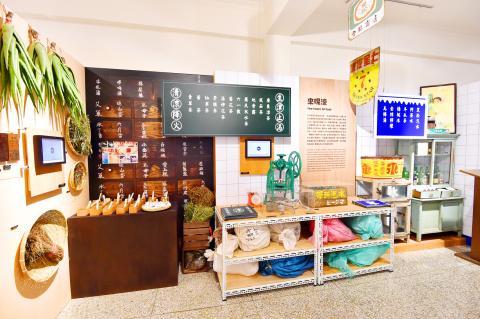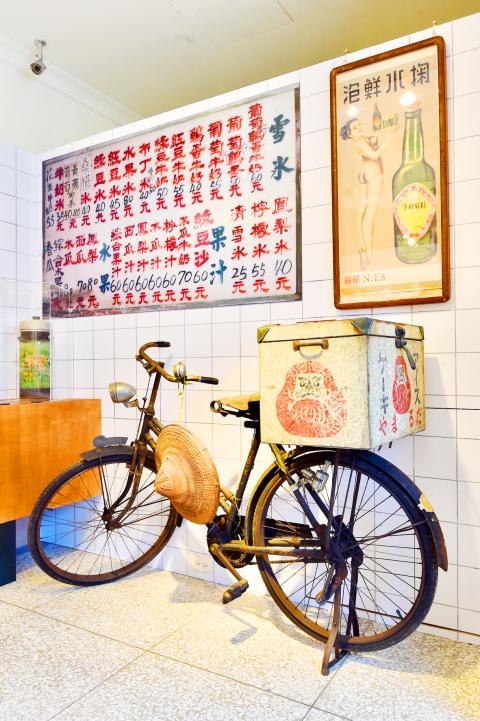Museum 207 (二0七博物館) has become one of the first private museums to receive an operation certificate under the Museum Act (博物館法), which founder and executive director Chen Kok-choo (陳國慈) hopes will help many private institutions to thrive.
The museum’s building, like those of many private institutions, has been designated a “historic building” by the Taipei City Government, Chen said, adding that the government should be commended for certifying private museums under the act.
“The act is a welcome change and crucial to the development of museums in Taiwan,” the Hong Konger said after accepting the paperwork that officially registered Museum 207 as a private museum in Taiwan.

Photo: Tu Chien-jung, Taipei Times
“This act lays out how the government will assist private museums,” she said. “Through the registration process, it will provide the resources that we need.”
The 2015 Museum Act promotes the development of public and private museums to improve people’s exposure to culture, history, science, nature, and the arts and humanities.
Museum 207, established in 2017, was the first in Taipei to apply for the official operation certificate, which gives it access to government funding and other resources.

Photo: Tu Chien-jung, Taipei Times
On June 27, 20 months after applying, the museum received the operation certificate and held an event on Monday to celebrate.
“I hope that in the future, private museums, especially those converted from old houses, will benefit from the government’s assistance, from the design stage to the renovation and construction stage, so that everything is done right,” Chen said, adding that she hopes the government would also support private museums’ operations through the program.
Being registered under the act gives the museum two main advantages: tax breaks and, more importantly, funding from either the central government or the city for exhibitions, museum head administrator Fiona Wu (吳佩郁) said.
Having just been registered, Museum 207 has yet to apply for funding, Wu said, but she estimated that the government might subsidize up to 70 percent of each exhibition.
The act makes subsidies more direct, unlike previously, when the central government would give the funds to local governments, which would then disperse the money among various community exhibitions — a “big circle” that could take a while, Wu said.
Article 7 of the Museum Act commits the government to providing professional advice, technical assistance, personnel training and financial grants to both public and private museums.
Chen said that private museums like hers are culturally important, because they hold events — such as Museum 207’s Taste of Summer exhibition — that help visitors relive the past and appreciate traditional values.
The exhibition, being held until Dec. 15, portrays how Taiwanese spent their summers when there was no air-conditioning, Chen said.
“The ice shops of the past were the predecessors of today’s Starbucks and coffee shops, but a major difference was that the ice houses were where the whole family would go — but would you go to Starbucks with your whole family?” she said. “So it also represents a social change in family relations, and we would like to take people back to that time so that they can cherish what has passed.”
At Monday’s event, Deputy Minister of Culture Kevin Peng (彭俊亨) praised Chen for getting Museum 207 registered under the Museum Act and for her commitment to promoting culture, such as founding the Taipei Story House, which curates exhibitions on Taipei history.
The Museum of World Religions in New Taipei City and the Wufeng Lin Family Mansion and Garden in Taichung are other private museums that have registered under the act, the ministry said.

Chinese Nationalist Party (KMT) Chairman Eric Chu (朱立倫), spokeswoman Yang Chih-yu (楊智伃) and Legislator Hsieh Lung-chieh (謝龍介) would be summoned by police for questioning for leading an illegal assembly on Thursday evening last week, Minister of the Interior Liu Shyh-fang (劉世芳) said today. The three KMT officials led an assembly outside the Taipei City Prosecutors’ Office, a restricted area where public assembly is not allowed, protesting the questioning of several KMT staff and searches of KMT headquarters and offices in a recall petition forgery case. Chu, Yang and Hsieh are all suspected of contravening the Assembly and Parade Act (集會遊行法) by holding

PRAISE: Japanese visitor Takashi Kubota said the Taiwanese temple architecture images showcased in the AI Art Gallery were the most impressive displays he saw Taiwan does not have an official pavilion at the World Expo in Osaka, Japan, because of its diplomatic predicament, but the government-backed Tech World pavilion is drawing interest with its unique recreations of works by Taiwanese artists. The pavilion features an artificial intelligence (AI)-based art gallery showcasing works of famous Taiwanese artists from the Japanese colonial period using innovative technologies. Among its main simulated displays are Eastern gouache paintings by Chen Chin (陳進), Lin Yu-shan (林玉山) and Kuo Hsueh-hu (郭雪湖), who were the three young Taiwanese painters selected for the East Asian Painting exhibition in 1927. Gouache is a water-based

Taiwan would welcome the return of Honduras as a diplomatic ally if its next president decides to make such a move, Minister of Foreign Affairs Lin Chia-lung (林佳龍) said yesterday. “Of course, we would welcome Honduras if they want to restore diplomatic ties with Taiwan after their elections,” Lin said at a meeting of the legislature’s Foreign Affairs and National Defense Committee, when asked to comment on statements made by two of the three Honduran presidential candidates during the presidential campaign in the Central American country. Taiwan is paying close attention to the region as a whole in the wake of a

OFF-TARGET: More than 30,000 participants were expected to take part in the Games next month, but only 6,550 foreign and 19,400 Taiwanese athletes have registered Taipei city councilors yesterday blasted the organizers of next month’s World Masters Games over sudden timetable and venue changes, which they said have caused thousands of participants to back out of the international sporting event, among other organizational issues. They also cited visa delays and political interference by China as reasons many foreign athletes are requesting refunds for the event, to be held from May 17 to 30. Jointly organized by the Taipei and New Taipei City governments, the games have been rocked by numerous controversies since preparations began in 2020. Taipei City Councilor Lin Yen-feng (林延鳳) said yesterday that new measures by